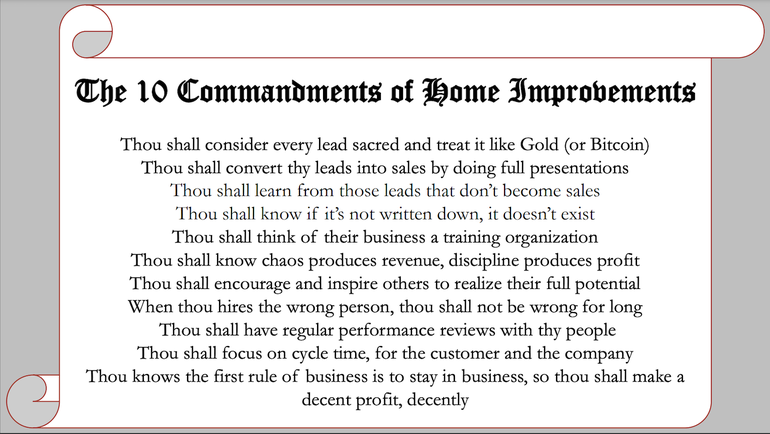5 Principles for 'Extreme Empowerment' in a Home Improvement Business
Tundraland founder and CEO Brian Gottlieb joined the 2022 Growth Mastery Summit to discuss the importance of this concept and how to build a business by building its people.

An overarching theme at the 2022 Growth Mastery Summit, hosted by Dave Yoho Associates, focused intently on successful and empathetic leadership. Brian Gottlieb, CEO and founder of renowned Wisconsin home improvement company Tundraland, shared his insights and expertise with event attendees on the importance of empowering employees versus micromanaging them and how this shift in strategy encourages a business’s growth and success over time.
“Empowerment without control will turn into chaos,” said Gottlieb. “Extreme empowerment is building a business by building its people.”
Here are Gottlieb’s five principles for successful business leadership in the modern world and how to employ them at your own construction company to achieve extreme empowerment with your team.
Principle 1: Belief is transferrable.
Gottlieb used the analogy of a child learning to ride a bike with—and then without—training wheels. That child will internalize the encouragement (or criticism) they receive while learning to ride a bike. Something similar happens at companies, too.
“As a company leader or owner, it’s crucial to tell people you believe in them, and why you believe in them," he said. "The more you believe in them and share that with them, the more that belief is transferred.”
To help transfer belief, use KPIs and other measurable targets across all reporting levels. Upward reporting especially helps create a team of co-producers and encourages employees at every stage of their careers to support the running of the business to the best of their abilities.
“You need to drive daily targets deep within the business,” said Gottlieb. “Every single target in your business starts with a yearly goal, made up of monthly targets and daily KPIs. The more you get your team to report on their numbers, the more empowered they’ll be to run their business.”
He also notes the importance of daily team huddles that create space for company leaders to bring alignment across the team and to drive home their belief in their employees’ abilities.
Principle 2: A successful business must have direction and purpose.
Defining a company’s direction and purpose lends itself to organizational and team alignment. Company leaders should ensure their business has three components:
Mission: Why does your business exist?
Vision: What does your business aspire to become? How does your team “win”?
Core values: What does your company stand for? What won’t your business tolerate?
Principle 3: It’s important to reframe a business as a training organization.
“To grow a business, you must commit to growing people,” said Gottlieb. “Hire people that want to be developed.”
Hiring such people gives leaders a chance to drive home the company culture, provide opportunities for growth within the business and learn from employees. The question leaders should ask themselves, according to Gottlieb, is, “To become a training organization, what must you become excellent at?”
Principle 4: Managers and leaders are both essential for a successful business.
The difference between managers and leaders, Gottlieb said, is managers navigate the day-to-day complexities inside a business and ensure systems and processes are being followed while leaders drive change. At the core, managers tell, and leaders show.
“Influence comes with leadership, and control comes with management,” he said. “A business requires both.”
Managers focus on the nuts of bolts of ensuring high performance at the company. They track measurements, including employee satisfaction, commitment, productivity, engagement and retention, to increase departmental or organizational performance. An essential part of this tracking is performance reviews, which allow managers to enact Principle 1 and identify what an employee does well, how their work stacks up across the company, areas of opportunity and actionable steps to take to make the most of those opportunities.
The role of a leader tends to be more esoteric and focused on the big picture. Great leaders, according to Gottlieb, are good coaches and mentors who empower their teams and do not micromanage. They work to create an inclusive environment, showing concern for success and well-being while also remaining productive and results-oriented. In addition, they have vital technical skills that help advise the company and keep the business on track with its mission, vision and values, and they exhibit strong decision-making capabilities.
Of course, managers can be leaders, and leaders can be managers. Still, it’s important to know the distinction within your own business to help determine where there may be opportunities for strengthening your leadership and management team.
Principle 5: The lead is sacred.
A seemingly obvious yet often overlooked aspect of any business reliant on sales is the importance of the lead. Gottlieb illustrated this via his “10 Commandments of Home Improvements” (pictured below).

Bringing his presentation full circle, Gottlieb drew particular attention to the importance of learning from leads that don’t become sales—and bringing that information to training—and the knowledge that “chaos produces revenue (and) discipline produces profit.”
About the Author(s)
You May Also Like




